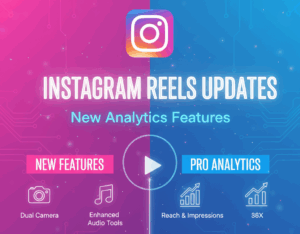The Ways in Which Artificial Intelligence Is Affecting Social Media Algorithms

The Ways in Which Artificial Intelligence Is Affecting Social Media Algorithms
The manner in which we engage with social media is undergoing a transformation as a result of artificial intelligence (AI). Artificial intelligence (AI) is an essential component in determining the user experience and level of engagement, since it is responsible for everything from predictive analytics to tailored content feeds. The algorithms that decide which material appears in users’ feeds, which postings get exposure, and how advertisements are targeted are increasingly reliant on artificial intelligence. This is especially true of social media platforms. The ways in which artificial intelligence (AI) has impacted social media algorithms and the consequences of this for individuals, artists, and companies are examined in this article.
1. Content Feeds that Are Personalized
Platforms for social media are able to customize the material they provide to each individual user with the use of artificial intelligence (AI):
- Behavior Analysis: In order to get an understanding of what users enjoy, artificial intelligence (AI) monitors the likes, shares, comments, and watch time of each user.
- Content Ranking: Using algorithms, postings are ranked and prioritized according to the level of interaction they are expected to get. This allows users to see the content that is most relevant to them.
- Improved User Experience: Personalized feeds keep users interested for a longer period of time and boost user retention rates.
2. Predictive Analytics and Recommendations
In addition to just displaying material, artificial intelligence algorithms are capable of anticipating what kind of content consumers are most likely to interact with in the future:
- Predicting Interests: In order to recommend new accounts, videos, or posts, machine learning algorithms examine trends in activity.
- Suggestions for material That Are Compatible with Multiple Platforms: Based on previous interactions, artificial intelligence may propose material that is compatible with a variety of applications and services.
- Increasing User Engagement: Artificial intelligence (AI) is able to assist platforms in maximizing user activity and session length by anticipating user preferences.
3. Advertising Targeting and Monetization
Digital advertising on social media platforms has been transformed as a result of artificial intelligence (AI):
- Segmentation of the Audience: With the help of artificial intelligence, micro-segments of users are identified according to their demographic information, their interests, and their activity on the internet.
- Optimized Ad Delivery: In order to boost conversions, machine learning algorithms ascertain the optimal location and time for advertising to be shown.
- Cost Effectiveness: Businesses are guaranteed to earn the most profit from their advertising budget when they use automated bidding tactics.
4. Finding Spam and Fake Content
Artificial intelligence (AI) assists in maintaining the integrity of platforms by removing information that is considered to be dangerous:
- Algorithms are used to detect fake news by flagging any information that is possibly misleading or untrue for further evaluation.
- Spam Control: Spam comments, bots, and accounts are identified and removed using artificial intelligence (AI).
- Content Moderation: In order to automatically analyze photos, videos, and text for policy infractions, platforms use artificial intelligence (AI).
5. Analysis of Influencers and Trends
Artificial intelligence (AI) helps producers and marketers to comprehend societal trends by:
- Algorithms are used to identify trending hashtags, topics, and material that has the potential to become viral, according on predictions about the future.
- Performance Insights: Artificial intelligence (AI) techniques are used to assess engagement numbers, which assists influencers in optimizing their messages.
- Strategic Planning: Marketers make use of artificial intelligence (AI) in order to schedule postings and plan marketing campaigns in order to have the most possible effect.
6. Challenges and Ethical Considerations
Artificial intelligence (AI) in social media raises ethical problems despite the fact that it offers certain advantages:
- Echo Chambers: Personalized feeds may strengthen current opinions, restricting exposure to other perspectives.
- Concerns of permission and security are brought to the forefront when Artificial Intelligence algorithms are trained on user data that has been collected.
- Algorithmic Bias: It is possible for machine learning algorithms to unintentionally favor some demographics or types of material over others.
7. Prospects for the Future of Artificial Intelligence in Social Media
Artificial intelligence will continue to grow, having ramifications for both the consumption and production of content:
- Experiences that are more personalized: Feeds will become more and more customized to suit the tastes of each person.
- Content Generated by Artificial Intelligence: Platforms may be able to incorporate artificial intelligence (AI) capabilities in order to assist creators in producing posts, videos, and graphics of high quality.
- Artificial intelligence (AI) will be used to improve content regulation in real time, which will result in a decrease in the amount of damaging conduct that occurs on the internet.
Artificial intelligence (AI) is crucial to the algorithms that power current social media platforms and has a significant impact on how material is found, consumed, and monetized. It does provide a number of ethical and privacy problems, despite the fact that it provides advantages such as predictive insights, individualized feeds, and increased engagement. Users, producers, and corporations will be able to use social media in a responsible and purposeful manner in 2025 and beyond if they have a good understanding of the role that artificial intelligence (AI) plays.




